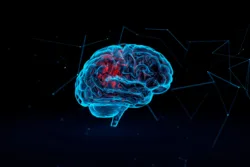
Transcranial magnetic stimulation (TMS) is a technology that was established in the 1980s and FDA-approved for the treatment of Treatment-Resistant Depression (TRD) in 2008. There have been many randomized controlled studies that have found TMS to be beneficial to help resolve TRD following its FDA approval.
TRD, in general, is depression that does not respond to traditional pharmacotherapy. With TRD, symptoms of depression do not completely resolve or change at all, despite adequate medication management.
Transcranial magnetic stimulation utilizes a magnet similar to an MRI machine, but on a much smaller scale. This magnet is placed on your scalp to target key regions of the brain that are theorized to help stimulate parts of the brain that are less active in a depressed person. Using the TMS machine for only 20 minutes, five days per week, and for six weeks encourage new neural connections that may help one feel less depressed.
As you can see TMS treatment requires a regular time commitment to help solidify these brain changes. One may expect to feel the results from TMS in as soon as two weeks as compared to traditional pharmacotherapy which may not take effect for six to eight weeks.
Clients who benefit from TMS treatment can even follow up on a less frequent basis for additional treatments after the initial six-week course of treatments to help maintain the positive results. TMS is not a magic bullet. If you benefitted from talk therapy, increased physical activity and/or a reduction in stress this will help bolster the benefit of TMS similar to taking medication and continuing to go to talk therapy to treat depression.
Here at The Light Program, we’re happy to be able to offer this evidence-based treatment for depression and hope that you reach out to us to see if transcranial magnetic stimulation is right for you.
Written by: Nedson Campbell, MD





